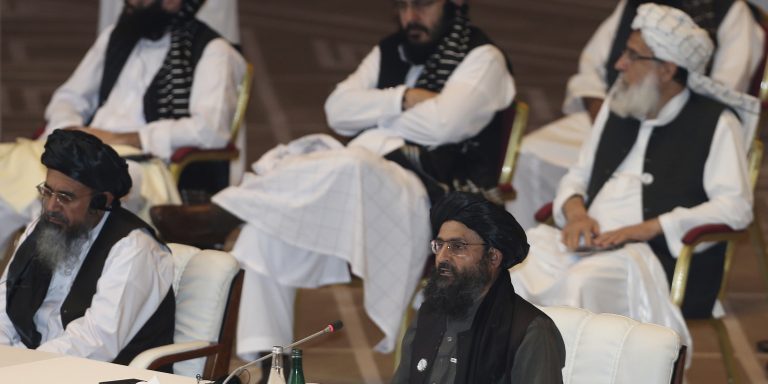INTELBRIEF
September 25, 2020
IntelBrief: Taliban Ramps Up Violence in Prelude to Afghan Political Negotiations

Bottom Line Up Front
- While the Taliban seems comfortable with a ‘fight and talk’ approach, U.S. officials have voiced serious concerns as to the insurgents’ sincerity as peace talks begin.
- Afghan peace talks have hit some early stumbling blocks, with both sides unable to reach consensus on the contours of a cease-fire and the parameters of a future power-sharing arrangement.
- Critics of the Afghan peace deal have commented on recent developments, including Trump’s former national security adviser, H.R. McMaster, who described elements of the deal as ‘wishful thinking’ based on ‘fantasy.’
- The primary objective for the United States should be to deny Afghanistan as a safe haven for transnational terrorist groups—including al-Qaeda and the Islamic State Khorasan Province (ISKP).
In a speech to the United Nations General Assembly (UNGA) earlier this week, U.S. President Donald Trump declared his administration’s intentions to end the war in Afghanistan, remarking, ‘we are bringing our troops home.’ Trump made this announcement just one week after violence raged throughout various parts of the country. In northern Afghanistan, an airstrike conducted by Afghan forces led to the death of more than a dozen civilians. In eastern Afghanistan, a roadside bomb struck a wedding convoy. And in Kandahar, more than a dozen rockets have been fired at two U.S. bases in the past week. The European Union Special Envoy for Afghanistan, Roland Kobia, noted that recent violence in Afghanistan has reached some of the highest levels at any point in the past five years. The Taliban has eschewed claiming attacks more recently, including ambushes and IED (improvised explosive device) attacks. While the Taliban seems comfortable with a ‘fight and talk’ approach, U.S. officials have voiced serious concerns as to the insurgents’ sincerity as peace talks begin.
President Trump recently lavished praise on the Taliban, describing the group as ‘very tough,’ ‘very smart,’ and ‘very sharp,’ while also claiming that the Taliban is ‘tired of fighting,’ despite evidence to the contrary from the battlefield. U.S. Secretary of State Mike Pompeo recently returned from Doha, where he attended the opening ceremony of the first formal meeting between Taliban representatives and Afghan government officials to move forward with a peace agreement. However, there have been some early stumbling blocks, with both sides unable to reach consensus on a number of significant factors related to the proposed settlement, including the contours of a cease-fire and the parameters of a future power-sharing arrangement. Historically, negotiated settlements take years to conclude, and are often plagued by significant setbacks and episodic violence.
High-profile critics of the Trump administration’s Afghan policy have commented on recent developments. Trump’s former national security adviser, H.R. McMaster, claimed that the President’s push to get a deal done with the Taliban was based on ‘fantasy’ and ‘wishful thinking,’ especially with respect to the Taliban’s alleged break from al-Qaeda. Moreover, many of the recent projections of al-Qaeda have underestimated the group’s strength, especially in Afghanistan. By downplaying al-Qaeda’s capabilities in Afghanistan, as well as by attempting to sell the idea that the Taliban will formally break with al-Qaeda, Secretary of State Pompeo is conducting a public relations campaign, designed to make the Trump administration’s decision to withdraw troops more palatable. To date, the Trump administration has not discussed what would happen if U.S. troops were withdrawn and the Taliban decided to continue, or even increase its partnership with terrorist groups like al-Qaeda and the Haqqani network.
The United States cannot remain in Afghanistan indefinitely. But removing troops based on an arbitrary timeline, or to prove a campaign talking point, is counterproductive and will further destabilize the country at a time when security is crucial to any hopes that a negotiated political settlement can succeed. The Trump administration should be transparent about the risks of drawing down forces in Afghanistan, and should explain why it believes the Taliban will formally break with al-Qaeda, especially as many counterterrorism analysts believe this to be pure folly. Any chance of a successful power-sharing agreement in Afghanistan requires the United States to continue providing robust support to the Afghan government and the Afghan security forces. The primary objective for the United States should be to deny Afghanistan as a safe haven for transnational terrorist groups—including al-Qaeda and the Islamic State Khorasan Province (ISKP). Without a residual counterterrorism capability in Afghanistan, Washington risks watching the country once again become a sanctuary for groups looking to impose a draconian version of Islam on the population while partnering with groups like al-Qaeda, which will continue to target the United States and its allies.